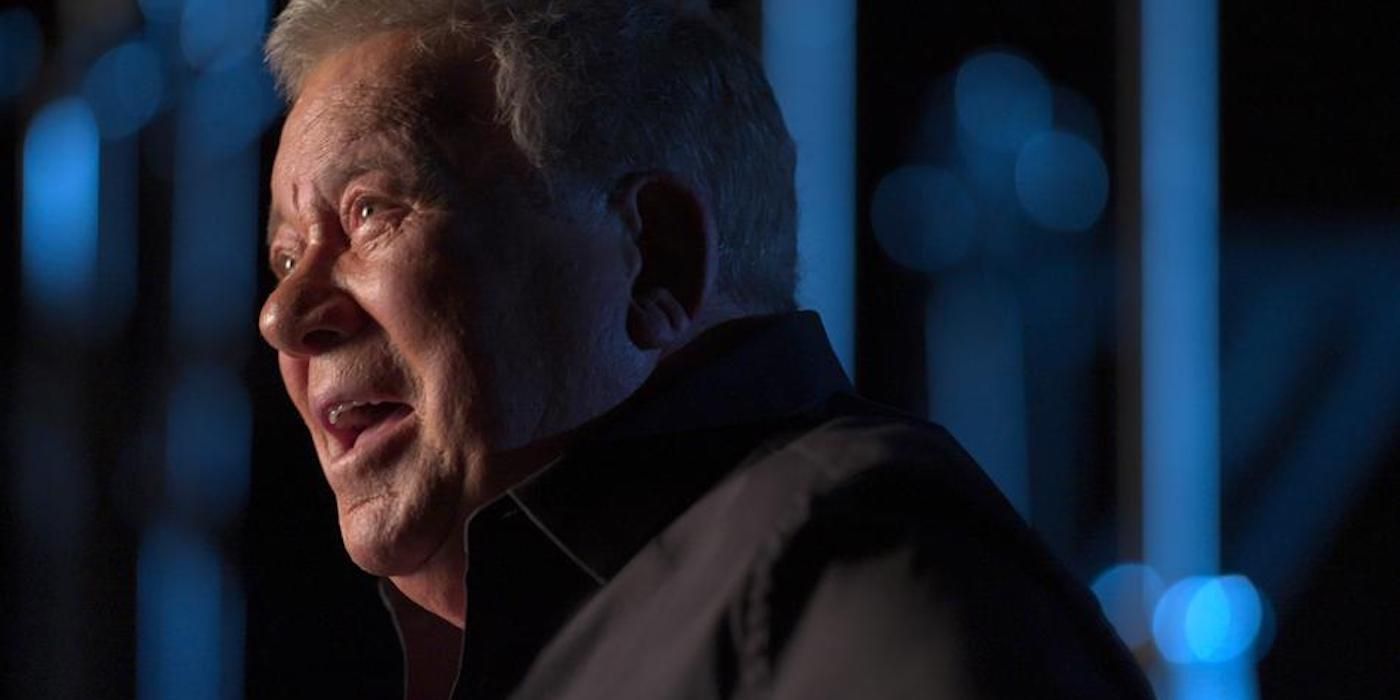William Shatner has lived quite the life, and that isn’t just because he is 91-years-old. It’s because of what he’s done with his time on this Earth and how he approaches everything, big and small, with a sense of wonder. He wants to be a tree. Yes, yes, a tree. (More on that later.) As the screen legend reflects on his life, he looks back at not only what has happened, but what will—or won’t happen—when we die. The documentary You Can Call Me Bill is a vessel for the Hollywood icon’s deepest thoughts, insecurities, questions, and curiosities about life.
It is not a “documentary” documentary, instead feeling more like a series of beautiful TED Talks or college philosophy lectures than it does a true homage to the star. Unlike typical documentaries, we never really see Shatner in his normal habitat or get the sense that we are “following” him as he goes about his life. There’s no shaky camera at a weird angle trying to capture Shatner in the moment while he doesn’t realize he’s on camera. We don’t see him interact with anyone. Not family, not friends, not strangers. We surprisingly don’t have any talking head interviews with people that know him who could give insight into how others perceive him. This is just Bill, from beginning to end, in an office-style chair in an empty studio. Bill and his innermost thoughts and reflections. Talking directly to you.
Director Alexandre O. Philippe creates a bare, but special environment here. The film might lack the frills of a normal documentary, but this stripped-back approach best matches one of the major topics Shatner is fascinated with: masks. Not COVID masks, not Halloween masks, but the masks we wear—both intentionally and unintentionally—when in different situations and with different people. “Every human being is limited by what they are,” Shatner explains during a portion of the doc that explores this very notion. “I think that everybody wears a mask. Everybody, until you take it down, we’re all holding a mask up to various times to various people. We’re holding up the mask that I think is what we expect them to think. I want them to realize what they are thinking about me is true.”
Peppered throughout the reflective documentary are glimpses into the Emmy winner’s personal and professional life. He didn’t have a close or affectionate relationship with his parents, especially to his surprise, his mother. That, plus fights and identity struggles in school (navigating life as a jock and a theater lover), made for a somewhat difficult Montreal upbringing. Though he found solace in the movie theater, telling stories, and moving people to tears on stage. Of course, he will forever be remembered the most for playing Captain Kirk on the original Star Trek series in 1966 for nearly 80 episodes as well as seven of the films.
Shatner knows he didn’t just play Kirk, but that he will always be Kirk to a lot of people. And he embraces it. His love and appreciation for the character and his fans is admirable. (This entire documentary, in fact, was made using “Fan-First Financing” from Legion M, which means 1,200 fans are the reason why this project exists in the first place.) At George Lucas’ AFI Lifetime Achievement Award, he poked fun at the Star Trek and Star Wars space rivalry and pretended to think he was speaking not in a tribute to Lucas, but at a Star Trek convention. Needless to say, the audience enjoyed the fact that he doesn’t take himself too seriously.
But what he does take seriously is the Earth and everything that has and will ever exist on it. Shatner seems the most passionate when talking about the environment and how humans, the extraordinary creatures that we are, are simultaneously enhancing and destroying the only home we ever knew. It’s interesting how much of the documentary doesn’t have to do with Shatner per se, but rather with what fascinates him and keeps him up at night. The miracle of life, the Earth, death and all its trappings are mostly what he spends time thinking about. His eloquent Shatner cadence that we all know and love helps soften the blow of the blunt ways he tackles such delicate topics. “The occasion of your death is meaningless,” is just one of the dozens of philosophical and thoughtful lines he ruminates on, and hopes an audience of all ages will, too. This is not meant to instill fear or dread, but to remind others about how precious life actually is.
Early on in the documentary, he establishes what has enabled him to get to where he is now, a 91-year-old who recently went to outer space and starts every morning with a ride on his horse and has never felt more creative or energetic. He lives with the priority to “take care of your inner child” in order to spark curiosity, wonder, and mysticism with even the most mundane or routine activities. “As you get a job, and you get married, or you have children. Life’s exigencies prey on you and that curiosity is generally beaten out of you, in school, in life. You lose the curiosity.” It’s because he made a conscious effort to keep that curiosity muscle strong, he believes, that has helped him live such a rich life. That, and his mindset of “living in the now.”
But what about that business of him wanting to be a tree? The film nicely bookends Shatner’s story with what he wants to happen when he dies. He has plans in place to have his ashes buried along with a Red Oak tree in California in order to return to and help the Earth long after he’s physically there. William Shatner, er, Bill is the walking—or horse riding—definition of “older and wiser,” and You Can Call Me Bill showcases that. While fans might wish for a more traditional “follow me around” documentary that dives deep into all things Captain Kirk, this softer, more contemplative side is just as profound as the legacy he will leave behind.
Rating: B+
You Can Call Me Bill premiered at the SXSW Film Festival.


